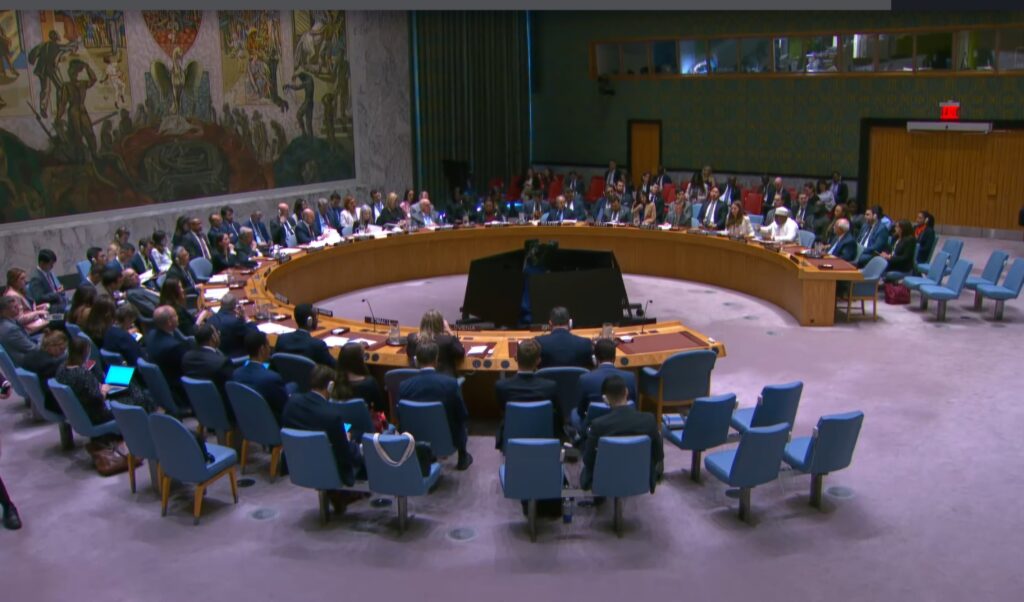STATEMENT BY
H.E. ALHAJI MUSA TIMOTHY KABBA
MINISTER OF FOREIGN AFFAIRS AND INTERNATIONAL COOPERATION
I thank Mr. President, Excellency Mr. Jean-Noël Barrot, Minister for Europe and Foreign Affairs of France.
I thank you for convening this important ministerial-level debate.
I also thank the Secretary-General for his briefing and unwavering leadership in seeking peace in the Middle East under deeply challenging conditions.
This meeting comes at a moment of grave urgency. The prolonged Israel-Palestine conflict continues to inflict devastating humanitarian, security, and political consequences, destabilizing the region and challenging the collective conscience of the international community.
The recent and continued violations of ceasefire agreements have worsened an already catastrophic humanitarian situation. In the Gaza Strip and West Bank, we are witnessing an alarming deterioration, characterized by mass civilian casualties, repeated displacement, and widespread destruction of infrastructure, an affront to international humanitarian law and the rules-based international system.
Reports indicate that 1,890 people were killed between 18 March and 17 April, including 595 children. Indiscriminate airstrikes on densely populated areas and IDP camps have resulted in appalling civilian casualties. The use of incendiary weapons in these attacks has left women and children burned alive in their shelters, deepening trauma and collective despair. Repeated evacuation orders have displaced over 420,000 people within a matter of weeks.
The total blockade of humanitarian aid and commercial goods since 2 March 2025 is a man-made catastrophe. Despite the presence of food convoys by UNRWA and the World Food Programme (WFP), access remains blocked. WFP’s recent warning of depleted food reserves and the possible suspension of operations is a dire signal.
Medical facilities, already overburdened and under-equipped, face collapse. Fuel, medicine, clean water, and electricity are almost non-existent. Humanitarian personnel operate under immense risk, dozens have been killed, while UNRWA, a lifeline for millions of Palestinians, faces obstruction, politicization, and underfunding.
The legal obligations of the occupying power are clear. Under the Fourth Geneva Convention, Israel, as the occupying power, is bound to ensure the welfare of civilians in the Occupied Palestinian Territory (OPT), including access to food, water, shelter, and medical care. These obligations are not discretionary.
In this regard, Sierra Leone strongly supports the submission of the United Nations to the International Court of Justice (ICJ), which reaffirmed Israel’s continuing legal obligations toward the United Nations, UNRWA, and the people under occupation. The UN’s legal position is unambiguous: Israel cannot derogate from its responsibilities under international law and must allow unhindered humanitarian access.
Mr. President,
The situation in the West Bank, including East Jerusalem, is equally concerning. Settlement expansion, the demolition of homes, and restrictions on Palestinian movement continue to intensify. Thousands remain displaced in Jenin, Tulkarm, and other communities. These actions risk undermining the path toward a two-State solution and must cease.
Sierra Leone underscores the urgent need for accountability and compliance with international humanitarian law (IHL). Despite the non-convening of a Conference of High Contracting Parties to the Fourth Geneva Convention, with the aim of reaffirming legal protections, assessing compliance, and advancing mechanisms for accountability, Sierra Leone continues to urge for compliance with IHL and a constant reaffirmation of its principles.
As a country that emerged from conflict through multilateral solidarity and principled diplomacy over two decades ago, Sierra Leone believes in peace through lawful and negotiated settlement, not through violence or collective punishment. In this regard, we emphasize the following priorities:
First, improving the security situation. We unequivocally condemn the targeting of civilians, hostage-taking, and all forms of attacks on non-combatants. We reiterate our call for the immediate and unconditional release of the remaining 59 Israeli hostages held by Hamas and urge all parties to commit to a renewed cessation of hostilities. Security Council Resolution 2735 (2024) provides a foundation for dialogue.
Second, ensuring humanitarian access. Humanitarian assistance must not be politicized or weaponized. We call for the safe, sustained, and unimpeded access for aid agencies across all border entry points into Gaza, including the Rafah, Kerem Shalom, and Erez crossings. We reject restrictions placed on UNRWA and other aid organizations and support full resumption of their work. The international community must urgently act to avert a famine and allow the continuation of critical health interventions, such as the forthcoming round of polio vaccinations.
Third, supporting a renewed peace process. The current cycle of violence once again proves that occupation, blockade, and unilateral actions cannot form the basis for peace. We welcome the initiative by France and the Kingdom of Saudi Arabia to co-chair an international conference on the Middle East Peace Process and call on all parties to approach the process in good faith. This effort must be anchored in international law, relevant UN resolutions, and long-standing frameworks such as the Arab Peace Initiative and the Quartet Principles.
Sierra Leone continues to support the internationally endorsed vision of two States, Israel and Palestine, living side by side in peace and security, with East Jerusalem as the capital of a future Palestinian State, and a return to the 1967 borders. We reaffirm our call for the full implementation of all relevant Security Council and General Assembly resolutions, and we encourage intensified diplomatic engagement by regional and international actors.
In closing, Sierra Leone joins others in renewing our collective call for peace, justice, and accountability. The road to peace must be paved with respect for international law, humanitarian principles, and the inherent dignity of every human being in the region, in particular the people of Israel and Palestine.
I thank you.



